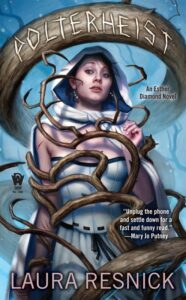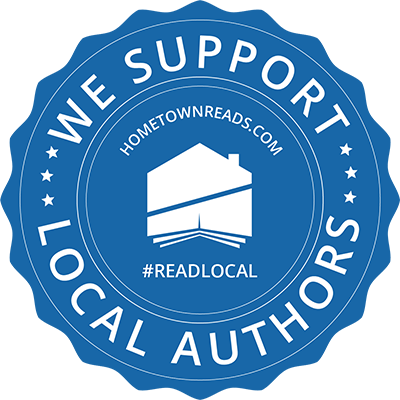Today, we’re excited to have Laura Resnick as our guest! Please welcome her as she shares with us about her writing experiences.
 Laura Resnick is the author of the popular Esther Diamond urban fantasy series, whose releases include Disappearing Nightly, Doppelgangster, Unsympathetic Magic, Vamparazzi, Polterheist, and the upcoming The Misfortune Cookie. She has also written traditional fantasy novels such as In Legend Born, The Destroyer Goddess, and The White Dragon, which made multiple “Year’s Best” lists. She began her career as the award-winning author of fourteen romance novels, written under the pseudonym Laura Leone. An opinion columnist, frequent public speaker, and the Campbell Award-winning author of many short stories, she is on the Web at LauraResnick.com.
Laura Resnick is the author of the popular Esther Diamond urban fantasy series, whose releases include Disappearing Nightly, Doppelgangster, Unsympathetic Magic, Vamparazzi, Polterheist, and the upcoming The Misfortune Cookie. She has also written traditional fantasy novels such as In Legend Born, The Destroyer Goddess, and The White Dragon, which made multiple “Year’s Best” lists. She began her career as the award-winning author of fourteen romance novels, written under the pseudonym Laura Leone. An opinion columnist, frequent public speaker, and the Campbell Award-winning author of many short stories, she is on the Web at LauraResnick.com.
“Crap”
by Laura Resnick
Like many writers, there are days when I have trouble concentrating on my work because of crap. And overcoming this problem is crucial for maintaining a writing career—which is about writing story after story after story, after all.
“Crap” is the word I use for an obstacle placed in your creative path by outside forces. And it’s a bitch.
Crap is when water starts pouring through the electrical fixtures on your bathroom ceiling from the apartment overhead, for example, and you can’t get a maintenance guy on the phone for two hours. Crap is when most of your time and energy are consumed by trying to straighten out the chaos caused by identity theft. When the 2-week renovation job on your kitchen turns into a 6-month long nightmare followed by a lawsuit, that’s crap.
Which is not to say that crap is always petty, bureaucratic, or even deliberate. It can be a very serious, painful matter. It’s not uncommon for people to have trouble writing when they’re getting divorced, when caring for a sick or injured loved one, or after a bereavement. I think most editors respond with human decency when a writer is struggling to deliver a book or short story in such circumstances; but if an editor or agent responds like an insensitive jerk to such news, that would be an example of more crap.
A friend of mine who’s a writer and a psychologist says that sometimes you just need to give yourself permission not to write for a while. That doesn’t always go well with our release schedules, our financial needs, and our work ethic; but there’s no productive point in beating yourself up if some crap is just so overwhelming that, for a while, all of your creative energy is sucked up by dealing with it.
Crap is egalitarian, of course: it screws with people in every line of work. And every line of work has its own kind of crap. As writers, we deal with our vocation’s uniquely aromatic crap.
Rejection is perhaps the single most common form of crap in this profession. It doesn’t seem to get any easier to shovel, no matter how many books we sell along the way. Additionally, getting dumped by a publisher or an agent; seeing your book eviscerated by reviewers; discovering that due to publisher screw-ups your novel was released with 10,000 words missing; going a year, two years, seven years without a publishing contract; discovering that you’ve been plagiarized…
These are all typical examples of writer crap.
Unfortunately, crap is like death and taxes; it’ll always be around, there’s no escaping it. No writing career is ever free of crap. The key for the writer is to develop habits and strategies to keep working despite crap, rather than crawling into a deep hole and staying there because of it.
One technique that I’ve practiced (with varying degrees of success) in order to protect my creativity from crap is compartmentalization. There’s book time, and there’s real time. In book time, I try to shut out the world, to leave it outside the door while I work. It’ll be there when I stop working, eager to resume its noise; but if I can define this space as a place where it’s not allowed to intrude, then I can keep writing.
 My friend the psychologist says another useful strategy, particularly in the face of rejection, is to remember not to buy into someone else’s perceptions of you or your work.
My friend the psychologist says another useful strategy, particularly in the face of rejection, is to remember not to buy into someone else’s perceptions of you or your work.
A great example of this: I know a writer who once delivered a novel that an editor declared unacceptable, unpublishable, and “unsalvageable.” The author believed in the book and wanted to see it published, so she spent a year doing multiple revisions rather than give up on it, while the editor kept making emphatically negative comments about the results. After encountering a final, no-further-discussion refusal to accept or publish the novel, rather than sink into a black hole of tail-chasing despair, the author wrote a replacement novel. Thus she maintained her profitable association with that publisher. (Luckily, though, the difficult editor resigned around the time the author delivered the replacement book).
I asked this author how she had managed not only to keep steadily revising the “unsalvageable” novel (which sold the following year to another house in a very good deal), but also to face the daunting task of immediately writing a replacement novel right after this confidence-draining experience.
She admitted to the moments of doubt and anxiety that we all have, but said, “But at heart, I knew I was a competent writer no matter what a volatile editor told me.”
 In other words, she didn’t let that editor’s perceptions screw with her belief in her work. Thus she maintained enough confidence to protect her creative flow and keep writing despite the demoralizing, year-long experience described above.
In other words, she didn’t let that editor’s perceptions screw with her belief in her work. Thus she maintained enough confidence to protect her creative flow and keep writing despite the demoralizing, year-long experience described above.
I learned the hard way that another key strategy for protecting creative health is to eliminate destructive influences from your professional life. I dealt for several years with an editor whose unprofessional behavior I found so stressful and damaging that, by the time I finally put my foot down and flatly refused to keep working with that individual, I was suffering, for the first time in my life, from multiple stress illnesses: insomnia, indigestion, heartburn, intestinal trouble, chronic migraines, facial ticks, muscle twitches, and a weird psychosomatic pain on my left side that made typing almost impossible. And within 48 hours of my getting the news that I had been reassigned to another editor…all these symptoms miraculously disappeared, as if they had never existed. And they have never returned.
In retrospect, I only wonder why I let things get that bad before drawing the line. Who needs that crap?
Thank you, Laura, for being with us today! Please feel free to post a question or comment for Laura. She’ll be with us all day. Thank you!



Awesome stuff. It has taken me nearly four years to get my children’s fantasy to a point that it may be ready. But along the way there has been a ton of crap getting in the way. You just have to keep plugging along. There where times over the last few years where my goal was to write one sentence a day. It was too overwhelming to think I needed to sit down and write even one page because of crap going on. Thanks!
An enjoyable and important blog, Laura. Finding a balance between powering forward through the crap or taking a reasonable break to get away from the crap is an important skill for every writer.
Joanie, Diana Gabaldon wrote several enjoyable essays about her writing life when she was raising three kids and working a full-time job while writing OUTLANDER, and about juggling family and household obligations and schedules while writing some of the later books under the pressure of publishing schedules, etc. I remember one of these essays giving a blow by blow account of a day in which she only gets about 300 words written on a book that’s got a release date and is nowhere near finished yet–but as she says, at least it’s 300 words written that day. 🙂
Thanks Laura! This is so true. It’s a good reminder to compartmentalize
things during these rough times. Because no matter who you are … crap always
happens.
I present a workshop on how to write, edit, and publish, and I’m always meeting people who let all that crap get in the way of their dreams. Those people will never get published. It’s hard for me to tell them that, but I can hear it in their voices. Only by getting that shovel out and working thorugh the pile will a person be able to ignore the distractions, the criticism, the self-doubt, and all the other obstacles.
One of my early experiences with realizing how unsuited some people are to writing professionally occurred at the first-ever reader/writer event I attended a few months after selling my first book. A woman at the event told me she had completed 9 romance novels…. but she’d never submitted even ONE of these books to even ONE publisher. I said, well, writing is also a great hobby, a satisfying thing to do for your personal pleasure; there’s no OBLIGATION to send MSs to publishers in pursuit of becoming published.
She said, no, it was NOT her hobby, she was a serious aspiring writer, she WANTED to be published. I pointed out that, um, to get published, she would have to submit her MSs to a publisher. She said she couldn’t possibly do that, because they might reject her. I said, well, yes, that’s always a risk when you submit a book. Rejection is definitely one of the possibilities. But if you want to be published (“oh, I DO! I definitely do!”)… then you have to risk rejection and submit a book to a publishr (“oh, I CAN’T do THAT!”).
We went round and round like this for about 10 minutes. Then I exited to the bar.